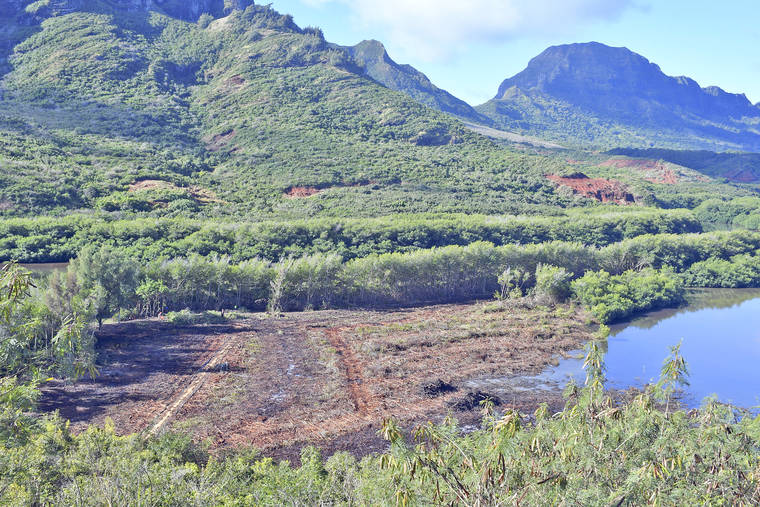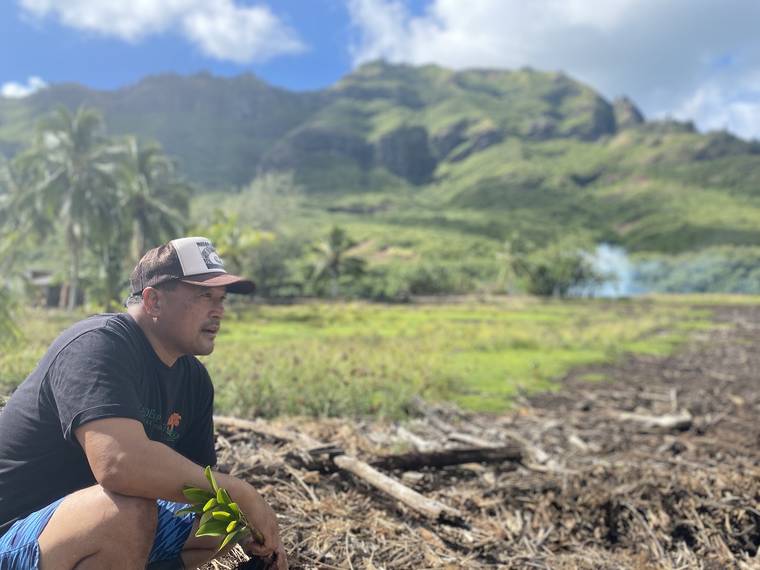LIHU‘E — At $3 million, an up-for-sale listing renders the Alekoko “Menehune” Fishpond at about $30,000 per acre for the two-parceled, culturally-historic area that legend says was built in one night by a human chain of the mythical Menehune for an accessible food supply.
Over the course of the last two years, the nonprofit Malama Hule‘ia has acted as a steward of the land, clearing over 26 acres of invasive mangrove to restore the 600-year-old watershed while under a 20-year lease agreement to use one 55-acre parcel.
With the property for sale now, Malama Hule‘ia is working in conjunction with another conservation nonprofit The Trust For Public Land to secure the 102-acre property for preservation and conservation.
“We are looking at the county, state, federal sources, having discussions at all levels as aggressively as we can,” longtime board member Jan TenBruggencate said Tuesday.
The Honolulu-based Okada Trucking Co. Ltd. owns the two parcels.
According to county property tax records, the 55.408-acre parcel is valued at $1,111,800 and the 46.641-acre lot is valued at $62,500. Both are classed as conservation, vacant land, and zoned Open District.
Aloha ‘Aina Project Manager Reyna Ramolete Hayashi of nonprofit The Trust For Public Land Hawai‘i said the organization has been approached by both the seller and Malama Hule‘ia, and is working as a bridge-builder to facilitate a potential conservation purchase with Malama Hule‘ia.
“Permanently protecting Alakoko would provide impactful community benefits, a healthy, clean watershed and river, restoring native wetland habitat, preserving a beloved cultural and historic site and an outdoor classroom for students to learn Hawaiian aquaculture, and the long-term potential to feed the Kaua‘i community,” Ramolete Hayashi said.
The listing of the property suggests the development of a single-family home with permits and preserving the fishpond through educational activities as potential activities on the land.
The fishpond was up for sale before. Back in 2005, the 102 acres were up for sale for $12 million.
The fishpond has been part of the U.S. National Register of Historic Places since 1973.
Over the years, Malama Hule‘ia has had over 3,000 volunteers participate in community-action days, Executive Director Sara Bowen said. Much of this work has been supported by grants from private and government funders, including a U.S. Fish and Wildlife Service Coastal Wetland Restoration Grant and private resources and donations through individuals.
Part of the land includes a 600-year-old archaeological wall, the restoration of which required removal of five acres of invasive mangrove, over 1,500 trees.
Conservation, preservation and holding the land in perpetuity for the public are among the main desires of acquiring the land, TenBruggencate said.
Available funding opportunities
In 2002, county voters approved a charter amendment that established the Public Access, Open Space, Natural Resources Preservation Fund, and stipulated that each year a minimum of 0.5% of the county’s real-property taxes be deposited into the fund.
There is approximately $2.5 million in this fund, and an estimated $780,000 to come in next fiscal year, which begins in July, according to county Finance Director Reiko Matsuyama.
The Trust For Public Land is currently in the process of working with Malama Hule‘ia to apply for different sources of public funding for the potential acquisition at county, state and federal levels.
On Thursday, the Kaua‘i County Council will meet for a special executive session with the Office of the County Attorney to discuss the utilization of the Public Access, Open Space, Natural Resources Preservation Fund for land-conservation purposes. Because this is a closed, private session, details about specific properties have not been disclosed.
The county’s Open Space Commission has been suspended since March 2020 due to the COVID-19 pandemic. This volunteer advisory committee has the authority to recommend and prioritize items on the preservation list. The Alekoko Fishpond has been on the list for some time now.
The council has the authority to utilize the fund to make acquisitions.
Council Vice Chair Mason Chock, a co-founding member of Malama Hule‘ia, has worked for over a decade on conservation of the stream, resigned from his post as president of the board earlier this month. Councilmember Luke Evslin also resigned from his seat on the board of the nonprofit.
In 2010, the council authorized the purchase of land surrounding Black Pot Beach Park in Hanalei for $3 million. This was a group effort, with the county putting in $800,000, the Open Space Commission’s fund providing $350,000, and Kaua‘i Public Land Trust securing $1.85 million from the state.
At the state level, Office of Hawaiian Affairs Kaua‘i and Ni‘ihau Trustee Dan Ahuna suggested the state’s Legacy Land Conservation Program could possibly be used for these types of efforts.
The application for this program, which is run through the state Department of Land and Natural Resources, is currently open for state agencies, counties and nonprofit land conservation organizations. County and nonprofit awardees must provide matching funds that cover at least 25% of total transaction costs, the application states.
“These are the types of spaces that are important and should be protected,” Ahuna said.
Without giving away too much, Chock indicated there are stakeholders interested in purchasing the land. Timing, Chock said, is important right now, and urged concerned citizens to avoid snap responses.
“If anything, allow the public trusts to work together to come up with a solution,” Chock said.
This article was updated Wednesday, Jan. 20 at 8:35 a.m. to provide additional information about The Trust For Public Land.







Excellent and important investment for all Kaua’i and our youth for preservation and education.
Pease continue to move forward on acquisition.
My understanding is a park and cultural center is planned, an excellent addition to Kaua’i.
Hawaii has lost many anciant monuments due to natural causes but mainly
to outside owners and investors. We know the ponds are there, the land sacerate and what it means to have developers disregard these monuments and land without a second thought. There is not enough money in the world to save Hawaii’s preciouse resources and cultural beauty. #ProtectLearnLove
Let’s remember that developers and investors wouldn’t be able to do anything with it if the land wasn’t for sale to begin with.
Those mythical Menehunes used to roam the nights in what is today Waimea. Waimea valley. They were about 3 feet something small men who would come out at nights to build damns and water ways in Waimea. They used these water ways to irrigate the vegetation and as well as use it as a reservoir to drinking water. They would carry huge stones to build these damns. Though I’ve never been inside middle of Kaua’i, that is what is said about these Menehunes. They would go back to the valleys and there they would make their abode. As the school suggest, Waimea High School Menehunes.